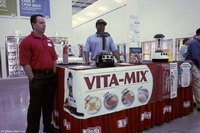TAMMY WYNEN stands near the back of a crowd outside a paper mill in Kimberly, Wisconsin. At a bank of microphones, speakers rail against Adam Smith; one, from the United Steel Workers, literally blames “The Wealth of Nations” for the mill’s impending closure. Many also hint that the soon-to-be unemployed mill workers should vote for Barack Obama in November.
But Mrs Wynen, a 27-year veteran of the paper mill, is not so sure. She cannot remember the last time she saw Mr Obama recite the pledge of allegiance. And her family loves Sarah Palin, John McCain’s new running-mate. Her children have lines from Mrs Palin’s convention speech off pat. Still, Mrs Wynen says she doesn’t know who she will vote for. The candidates look poised to spend a lot of time and money in Wisconsin wooing her.
Category: Taxes
Privatizing What the Public Paid For
“Right. It takes unconventional and courageous thinking to come up with a plan that clears a highway lane for the well off, while the middle class and working poor are left to inhale each other’s $5-a-gallon exhaust fumes. The worst thing about this ill-conceived decision … is it allocates freedom of movement according to income.”
— From “Diamond Lanes for the Rich,” by Tim Rutten (Los Angeles Times, April 26, 2008)
Few think of it this way, but America already has a major flat tax that we all pay equally: the 18.4-cent federal tax that is applied to each and every gallon of gasoline we purchase, or the 24.4 cents on every gallon of diesel. Say a young person, who just lost his job at McDonald’s, buys a gallon of gas to get to an interview at Burger King at the same time Warren Buffet buys a gallon of gas to get to the airport in Omaha to board his personal jet: Both the unemployed, below-minimum-wage worker and America’s richest billionaire contribute the exact same amount toward the nation’s highway system on that day.
Now, however, we are being told – to an increasingly urgent drumbeat – that America can no longer afford the luxury of building new infrastructure or even maintaining our current road system, because there’s just no funding for these programs. It’s here that the complete absence of critical thinking about America’s future should astonish and dismay anyone who looks at the facts even casually.
Dangerously in Debt
Former U.S. Comptroller General David Walker speaks out on the perils of the rising federal deficit in the new film “I.O.U.S.A.
If “An Inconvenient Truth” sounded the alarm on global warming, “I.O.U.S.A.,” a new documentary opening in theaters Friday, hopes to do the same for the rising federal deficit.
Backed by Blackstone Group Chairman Peter Peterson, “I.O.U.S.A.” follows former U.S. Comptroller General David Walker and the Concord Coalition’s Robert Bixby on a “fiscal wake-up tour” across America. In the movie, which is co-written by “Empire of Debt” co-author Addison Wiggin and directed by “Wordplay” filmmaker Patrick Creadon, Messrs. Walker and Bixby argue that unless the government alters its policies and spending habits, the U.S. will be in for a serious financial meltdown.
Big Box Retail 2008: Costco Arrives in (Madison) Middleton


Costco held a very well attended party this evening celebrating the opening of their new Middleton warehouse club [Map].
I did not see a stand to purchase law degrees.
Middleton provided a TIF (Tax Incremental Financing) agreement to the site developer. A related Isthmus article can be found here.
A few additional photos:
 |
 |
 |
 |
 |
 |
Clusty search: Costco.
Lessig on John McCain’s Technology “Platform”
I have my doubts – unfortunately – that Obama will be much better on the crucial broadband issue for two reasons:
- AT&T, very good at spreading the
lovemoney, or the king of telco lobbying is sponsoring the Democratic convention - Our own Democratic Governor – Jim Doyle, recently signed a AT&T supported “Video competition bill” into law – maybe useful for AT&T, but hardly good for citizens.
California Declares Free Market Broken, Recommends Price Controls For Phone Services
Verizon, AT&T, and their regulated cohorts love to blab how the “free market” and “competition” will keep prices low for consumers. According to California, it’s a big fat expensive lie. The cost of basic phone service has soared since the Public Utilities Commission lifted price controls in 2006, leading the agency to conclude:
“There is no indication of any change in the near future regarding the current state of competition. Market forces have not yet met the challenge of controlling price increases.”
Why No Outrage?
Raise less corn and more hell,” Mary Elizabeth Lease harangued Kansas farmers during America’s Populist era, but no such voice cries out today. America’s 21st-century financial victims make no protest against the Federal Reserve’s policy of showering dollars on the people who would seem to need them least.
Long ago and far away, a brilliant man of letters floated an idea. To stop a financial panic cold, he proposed, a central bank should lend freely, though at a high rate of interest. Nonsense, countered a certain hard-headed commercial banker. Such a policy would only instigate more crises by egging on lenders and borrowers to take more risks. The commercial banker wrote clumsily, the man of letters fluently. It was no contest.
The doctrine of activist central banking owes much to its progenitor, the Victorian genius Walter Bagehot. But Bagehot might not recognize his own idea in practice today. Late in the spring of 2007, American banks paid an average of 4.35% on three-month certificates of deposit. Then came the mortgage mess, and the Fed’s crash program of interest-rate therapy. Today, a three-month CD yields just 2.65%, or little more than half the measured rate of inflation. It wasn’t the nation’s small savers who brought down Bear Stearns, or tried to fob off subprime mortgages as “triple-A.” Yet it’s the savers who took a pay cut — and the savers who, today, in the heat of a presidential election year, are holding their tongues.
Biofuels Deathwatch Map
Biofuel plants have been put on hold faster than your phone company’s tech support line. With corn and soy prices hitting record high prices and an ethanol glut flooding the market, ethanol’s profit margin per gallon has dropped to a meager 25 cents from $2. That’s causing numerous ethanol and biodiesel plants to get put on hold or downright canceled. Hundreds of millions of gallons of production capacity and hundreds of millions of dollars in biofuel investments are now hanging in limbo, as investors hope prices will level out.
That’s not to say that ethanol is dead in the water. There’s a variety of positive reports coming out on the future of the industry — there’s reports that see a meaningful future for ethanol , as well reports saying ethanol could be deliver a better-than-expected energy return. Add in a healthy merger and acquisition market and biofuels will play a role in the future of weaning the U.S. off oil.
Tammy Baldwin’s Office on the Farm Bill
Dear Mr. Zellmer:
Thank you for contacting me about the 2007 Farm Bill (the Farm, Nutrition, and Bioenergy Act, H.R. 2419). It is good to hear from you, and I apologize for the delay in my response.
As you know, the U.S. House of Representatives recently considered the 2007 Farm Bill. The Farm Bill is a comprehensive piece of legislation which touches on a number of agriculture-related issues, including commodity price support programs, nutrition programs, alternative energy, and rural development.
After a considerable amount of deliberation in a conference committee, the House and Senate each passed a conference report that represented the resulting policy compromises. You may be interested to know that I joined my colleagues in the House of Representatives to pass this conference report by a vote of 318 to 106.
While I believe that the U.S. House of Representatives should have taken this opportunity to implement expansive agricultural policy reforms, I supported the conference report because it does contain some noteworthy improvements in the Farm Bill programs. The alternatives to reauthorizing the Farm Bill this year were to extend the previous version of the farm bill or to revert to regulations dating to the 1940s. In my view, neither of these alternatives are desirable or acceptable.
The aspects of the conference report that I strongly support include expanding and updating the Milk Income Loss Contract (MILC) program, and investments in nutrition programs that help 38 million American families afford healthy food. For the first time, the MILC program will include the cost of feeding dairy cows as a factor for triggering program payments, a relief for Wisconsin dairy farmers who face increasing costs of inputs. The nutrition title includes an additional $10 billion to expand food stamp eligibility and increase the minimum weekly benefit, as increase funding for many worthy programs such as food banks, food pantries, soup kitchens, and schools providing healthy snacks to students.
Russ Feingold’s Office on the Farm Bill & Special Interest Legislation from Herb Kohl
via email, in response to my message:
Dear Mr. Zellmer,
Thank you for contacting me to share you concerns about the Farm Bill. I appreciate hearing from you. While I was disappointed by the lack of reform to the commodity programs in the Farm Bill, significant improvements were made in other areas of the bill to assist small and medium farmers.
As you may know, the House approved the final version of the Farm Bill on May 14, 2008, by a vote of 318-106. The Senate passed it the following day by a vote of 85-15. The President vetoed the Farm Bill on May 21, 2008. The House voted to override the veto the same day, and the Senate the next day. I was pleased to support both the Farm Bill itself and the motion to override the President’s veto. The bill became law on May 22, 2008, although an enrollment error meant that the Trade and Food Aid Title was not included. The House and Senate have passed a new version of the bill to correct the error.
For instance, the bill restores the payment rate for the Milk Income Loss Contract (MILC) program and, for the first time, factors in the cost of production for farmers. MILC is vital for Wisconsin’s dairy farmers, and is an extremely responsible program as it kicks in when times are tough and covers only a certain amount of milk. Thus, it targets small and medium farms rather than subsidizing the expansion of large farms.
The bill also makes significant improvements to nutrition programs, including Food Stamps and the Emergency Food Assistance Program, totaling more than $10 billion over the five-year life of the bill and accounting for about three-quarters of total spending in the bill. Other positive provisions of the Farm Bill include a new livestock title, which contains important competition provisions and over $4 billion for agriculture conservation programs. The bill also provides more funding for smaller-scale programs such as the Community Food Program, Value-Added Producer Grants, and the Beginning Farmer and Rancher Program.
I was also able to have several amendments accepted to the bill on a range of issues important to Wisconsin farmers. I was particularly pleased to have an amendment accepted to strengthen the office for small farmers at USDA.
I share the disappointment I have heard from some Wisconsinites that the reforms in the Farm Bill don’t go far enough. I supported a number of amendments to reform the bill when the Senate considered it in December 2007, including an amendment offered by Senators Byron Dorgan (ND) and Chuck Grassley (R-IA) to cap subsidy payments to the largest producers. I also filed an amendment with Senator Robert Menendez (D-NJ) to trim direct payments. In addition, I supported and cosponsored an amendment offered by Senators Sherrod Brown (D-OH) and John Sununu (R-NH) to trim government subsidies to crop insurance companies, and voted in favor of an amendment offered by Senator Amy Klobuchar (D-MN) that would have prohibited farm support payments to wealthy individuals. I was disappointed that these amendments failed. The final bill does reform the commodity support programs by modestly trimming direct payments and reducing the adjusted gross income eligibility cap, but more reforms are needed.
To read my full statement on the bill, please visit here. While we may not always agree, I look forward to hearing from you in the future.
Speaking of our politicians, Bruce Murphy notes some special interest assistance from Senator Kohl and link to this New York Times article:
Senator Herb Kohl, Democrat of Wisconsin, persuaded the Appropriations Committee and the full Senate to accept legislative language benefiting Aurora BayCare Medical Center in Green Bay.
The hospital’s lobbyists include Theodore H. Bornstein, a former chief of staff for Mr. Kohl, and Bill Broydrick, whose Web site quotes a description of him as “the state’s No. 1 super lobbyist.”
The Kohl provision would allow the Green Bay hospital to expand by building a new cardiac catheterization laboratory.
The issue often puts lawmakers in the awkward position of having to choose between doctors and hospitals.
Critics say that when doctors have a financial stake in a hospital, they have an incentive to send patients there because they not only receive professional fees for their services, but also can share in hospital profits and see the value of their investment increase. Such arrangements can lead to greater use of hospital services and higher costs for Medicare and other insurers, say the critics, including many in Congress.
My email to Senator Kohl:
Dear Senator Kohl:
I hope this message finds you well.
I am writing to express my disappointment at your support for the “Aurora BayCare Medical Center in Green Bay” carve out in what I believe to be upcoming health care legislation.
http://www.nytimes.com/2008/06/08/washington/08hospital.html
Such narrow special interest treatment is at odds with your “Nobody’s Senator but Yours” mantra.
These carve outs simply increase costs for middle America.
I am disappointed.
Best wishes,
Jim Zellmer